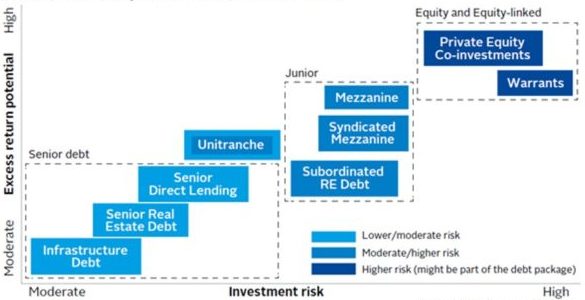A private debt fund is a direct lending fund, commonly in the form of a closed-end investment company, generally only for the investing of institutional investors and high-net-worth individuals (HNWI). Individuals () usually provide private debt via crowdlending platforms and investing in mutual funds, which also lend to property companies.
Private debt funds are commonly used for direct lending for real estate construction and property acquisition. Property developers also often lend against the projects of other developers since they have experience in such financing.


The mortgages against the properties serve as the security for lenders in private debt funds, which entitle the fund to take control of the underlying property in the event of default on their loans. Interest payments are the primary source of return on their investments.
A real estate investment trust (REIT) is a corporation, trust or association that finances, owns and typically operates income-producing property or related assets for its investors. REITs issue transferrable certificates that evidence ownership, a creditor position, or both in the form of an equity REIT, a debt REIT, or a hybrid REIT, respectively.
Debt REITs lend money directly to real estate developers, sponsors and buyers in the form of debt or debt-like instruments, including first mortgages, mezzanine loans, and preferred equity. Debt REITs generate revenue from the interest earned on the debt.
A mortgage REIT evidences a creditor position in mortgage loans either made directly to real estate buyers, developers and sponsors or to invest in outstanding mortgage loans or mortgage-backed securities (MBS). It generates revenue mainly from the net interest margin on the investments – the spread between the interest received and the cost of funding the loans.
For tax exemption, REITs are commonly required to distribute at least 90% of their annual taxable income to their shareholders. This applies to US REITs and REITs in most European countries.

